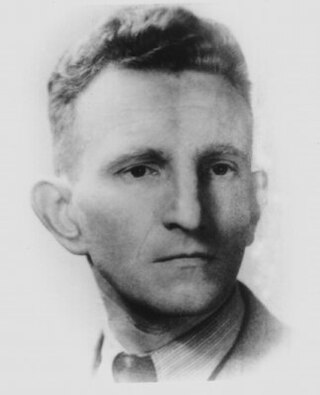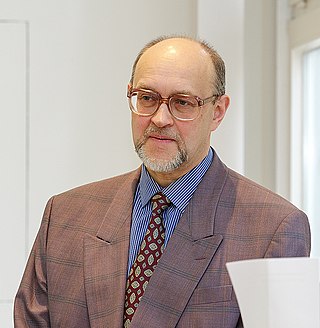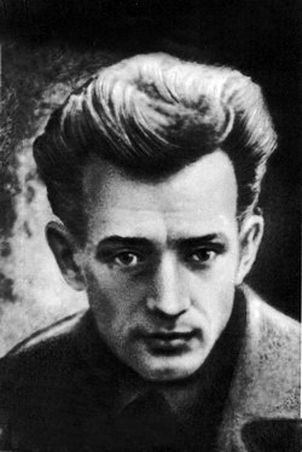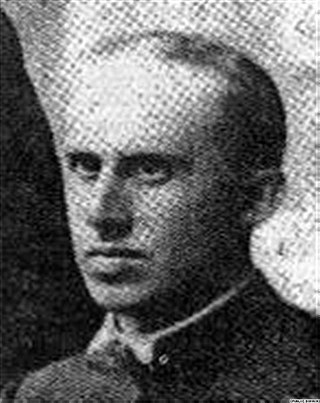
The Directorate, or Directory was a provisional collegiate revolutionary state committee of the Ukrainian People's Republic, initially formed on November 13–14, 1918 during a session of the Ukrainian National Union in rebellion against Skoropadsky's regime. During the overthrow of Pavlo Skoropadsky it was named as the Executive Council of the State Affairs. Its authority was extended by the Labor Congress of Ukraine on January 23–28, 1919.

Roman-Taras Yosypovych Shukhevych, was a Ukrainian nationalist and a military leader of the Ukrainian Insurgent Army (UPA).

Yaroslav Semenovich Stetsko was a Ukrainian politician, writer and Nazi collaborator, who served as the leader of Stepan Bandera's Organization of Ukrainian Nationalists (OUN), from 1968 until his death. During Operation Barbarossa, the Nazi German invasion of the Soviet Union in 1941, he was self-proclaimed temporary head of an independent Ukrainian government declared by Bandera. Stetsko was the head of the Anti-Bolshevik Bloc of Nations until 1986, the year of his death.

The Nachtigall Battalion, also known as the Ukrainian Nightingale Battalion Group, or officially as Special Group Nachtigall was a subunit under command of the German Abwehr special-operations unit Lehrregiment "Brandenburg" z.b.V. 800 in 1941. Along with the Roland Battalion it was one of two military units which originated on February 25, 1941, when the head of the Abwehr, Admiral Wilhelm Franz Canaris, sanctioned the formation of a "Ukrainian Legion" under German command. The Legion was composed of volunteer Ukrainians many of whom were members or supporters of Organization of Ukrainian Nationalists (OUN-B). The Batallion participated in early stages of Operation Barbarossa with Army Group South between June and August 1941.

Richard Franz Marian Yary (1898–1969) was a Ukrainian nationalist journalist, politician and military figure.

Bilhorod Kyivskyi or Belgorod Kievsky was a legendary city-castle located in Kievan Rus' that was located on the right bank of Irpin River and was mentioned in chronicles.
The Little Russian identity was a cultural, political, and ethnic self-identification of a population of Ukraine who aligned themselves as one of the constituent parts of the triune Russian nationality. The Little Russian identity combined the cultures of Imperial Russia and Cossack Hetmanate.

Volodymyr Potulnytskyi is a Ukrainian historian who specializes in European medieval history, Ukrainian political science, intellectual history, historiosophy and historiography of Eastern Europe.

Yevhen Pavlovych Pluzhnyk was a Ukrainian poet, playwright and translator from Eastern Sloboda Ukraine.

Samiilo Vasyliovych Velychko — was a Ukrainian Cossack nobleman and chronicler who wrote the first systematic presentation of the history of the Cossack Hetmanate.
Yaryzhka or Orthography of Slobozhanshchyna is the name of the Russian pre-revolutionary orthography used to write and print works in the Ukrainian language in the Russian Empire. Yaryzhka included all the letters that were part of the Russian Cyrillic alphabet of the pre-revolutionary period: ы, ъ, and so on.
Dokiya Humenna was a Ukrainian and Ukrainian American writer, one of the most prolific authors of the literary Ukrainian diaspora.
Arts of Ukraine is a collection of all works of art created during the entire history of Ukraine's development.
Manifesto to the Ukrainian people with ultimate demands to the Ukrainian Rada is an official document of the Council of People's Commissars of the Russian Soviet Federative Socialist Republic, prepared by the Chairman of the People's Commissar Vladimir Lenin, People's Commissar for Foreign Affairs Leon Trotsky, People's Commissar of Nationalities Joseph Stalin.
Kalenyk Vasyliovych Sheikovskyi was a Ukrainian linguist, ethnographer, publisher, teacher.

The Third Universal of the Ukrainian Central Council is a state-political act, universal of the Central Council of Ukraine, proclaiming the formation of the Ukrainian People's Republic. Accepted 20 November [O.S. 7 November] 1917 in November in Kyiv.

Peter Mytrofanovych Kravchenko was a Ukrainian artist and public figure.

Andriy Mikhailovich Bandera was a chaplain, politician and member of the Ukrainian National Rada of the Western Ukrainian People's Republic, veteran of the Polish-Ukrainian war, member of the Shevchenko Scientific Society, a priest of the Ukrainian Greek Catholic Church, and father of Stepan Bandera.

The 1921–1923 famine in Ukraine was a disaster that mostly occurred in the southern steppe region of Ukraine. The number of fatalities is estimated between 200,000 and 1,000,000, but no systematic records were then made.












